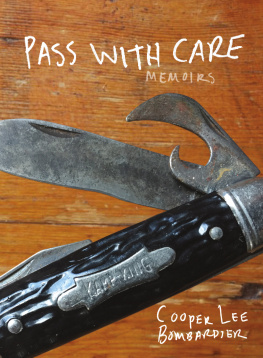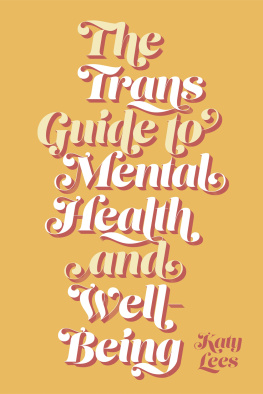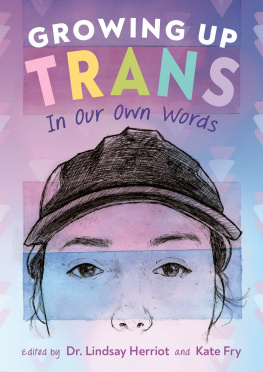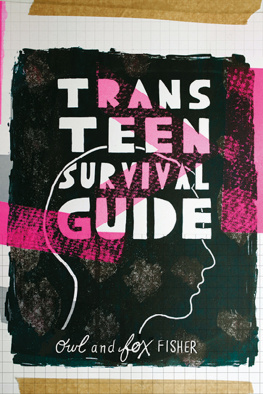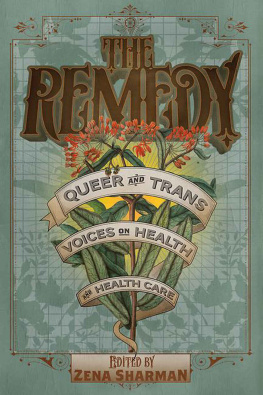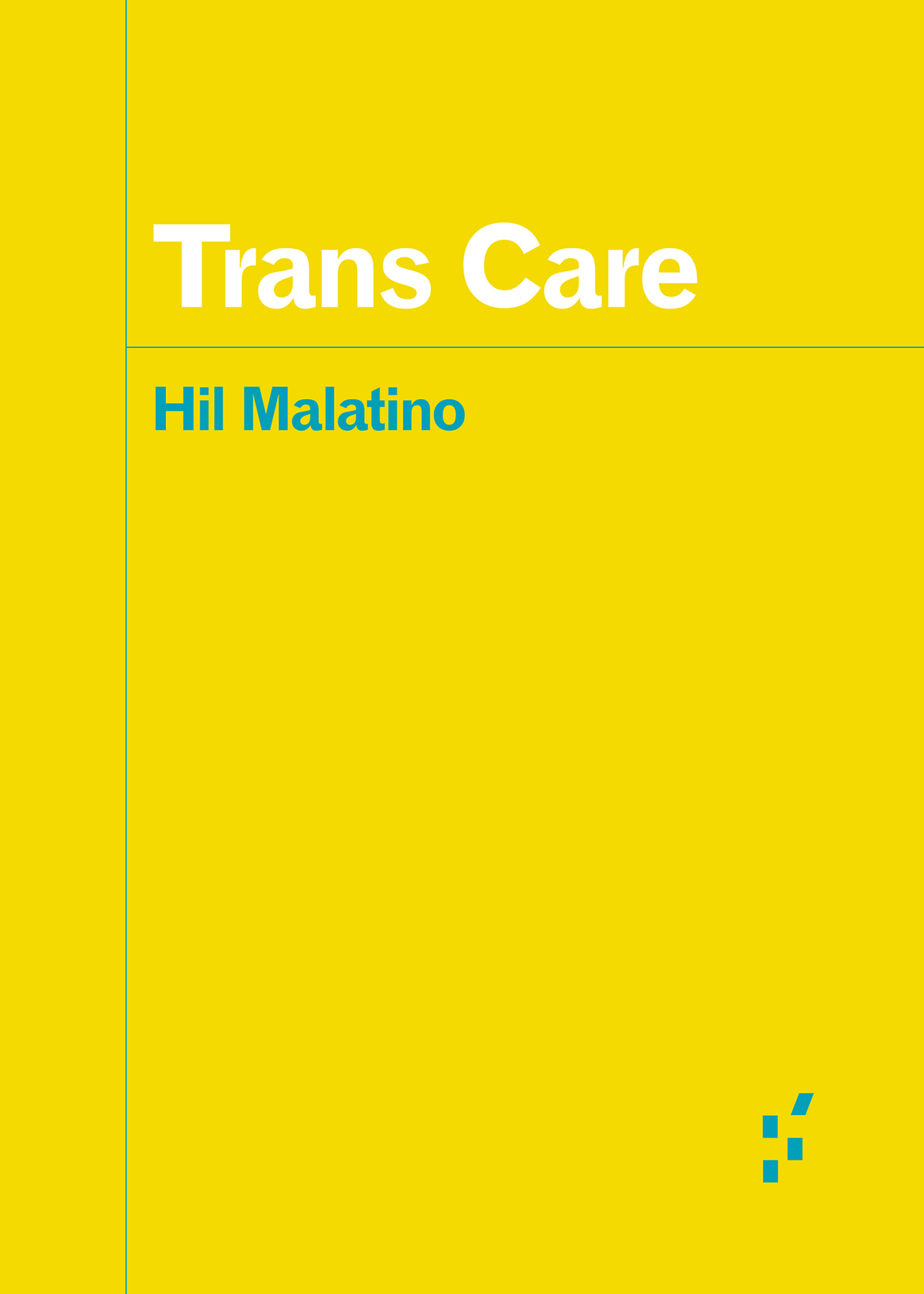
Trans Care
Forerunners: Ideas First
Short books of thought-in-process scholarship, where intense analysis, questioning, and speculation take the lead
From the University of Minnesota Press
Hil Malatino
Trans Care
Sarah Juliet Lauro
Kill the Overseer! The Gamification of Slave Resistance
Alexis L. Boylan, Anna Mae Duane, Michael Gill, and Barbara Gurr
Furious Feminisms: Alternate Routes on Mad Max: Fury Road
Ian G. R. Shaw and Marv Waterstone
Wageless Life: A Manifesto for a Future beyond Capitalism
Claudia Milian
LatinX
Aaron Jaffe
Spoiler Alert: A Critical Guide
Don Ihde
Medical Technics
Jonathan Beecher Field
Town Hall Meetings and the Death of Deliberation
Jennifer Gabrys
How to Do Things with Sensors
Naa Oyo A. Kwate
Burgers in Blackface: Anti-Black Restaurants Then and Now
Arne De Boever
Against Aesthetic Exceptionalism
Steve Mentz
Break Up the Anthropocene
John Protevi
Edges of the State
Matthew J. Wolf-Meyer
Theory for the World to Come: Speculative Fiction and Apocalyptic Anthropology
Nicholas Tampio
Learning versus the Common Core
Kathryn Yusoff
A Billion Black Anthropocenes or None
Kenneth J. Saltman
The Swindle of Innovative Educational Finance
Ginger Nolan
The Neocolonialism of the Global Village
Joanna Zylinska
The End of Man: A Feminist Counterapocalypse
Robert Rosenberger
Callous Objects: Designs against the Homeless
William E. Connolly
Aspirational Fascism: The Struggle for Multifaceted Democracy under Trumpism
Chuck Rybak
UW Struggle: When a State Attacks Its University
Clare Birchall
Shareveillance: The Dangers of Openly Sharing and Covertly Collecting Data
la paperson
A Third University Is Possible
Kelly Oliver
Carceral Humanitarianism: Logics of Refugee Detention
P. David Marshall
The Celebrity Persona Pandemic
Davide Panagia
Ten Theses for an Aesthetics of Politics
David Golumbia
The Politics of Bitcoin: Software as Right-Wing Extremism
Sohail Daulatzai
Fifty Years of The Battle of Algiers: Past as Prologue
Gary Hall
The Uberfication of the University
Mark Jarzombek
Digital Stockholm Syndrome in the Post-Ontological Age
N. Adriana Knouf
How Noise Matters to Finance
Andrew Culp
Dark Deleuze
Akira Mizuta Lippit
Cinema without Reflection: Jacques Derridas Echopoiesis and Narcissism Adrift
Sharon Sliwinski
Mandelas Dark Years: A Political Theory of Dreaming
Grant Farred
Martin Heidegger Saved My Life
Ian Bogost
The Geeks Chihuahua: Living with Apple
Shannon Mattern
Deep Mapping the Media City
Steven Shaviro
No Speed Limit: Three Essays on Accelerationism
Jussi Parikka
The Anthrobscene
Reinhold Martin
Mediators: Aesthetics, Politics, and the City
John Hartigan Jr.
Aesops Anthropology: A Multispecies Approach
Trans Care
Hil Malatino
University of Minnesota Press
Minneapolis
London
Trans Care by Hil Malatino is licensed under a Creative Commons Attribution-NonCommercial-NoDerivatives 4.0 International License.
Published by the University of Minnesota Press, 2020
111 Third Avenue South, Suite 290
Minneapolis, MN 554012520
http://www.upress.umn.edu

Available as a Manifold edition at manifold.umn.edu
The University of Minnesota is an equal-opportunity educator and employer.
Contents
Aftercare
Its a new year: 2020. I have top surgery scheduled in two weeks. Friends are beginning to rally, sending books they love through the post for me to read while Im stuck in bed, booking plane tickets to come help with domestic work that Ill be unable to do, volunteering to organize a post-surgery meal train, asking if I want to throw a farewell gathering to my tits (I dont). Im a little nervous about the surgery, but I have so many loved ones that have been through different iterations of it. I know their stories, I know their scars, I know sitting up and standing is going to be rough for a while, that I need bendy straws to drink through and that I shouldnt really lift anything for a good long while.
I feel lucky to have all these practical manifestations of love in the form of care work coming through. A partner to help me through the healing process. Trans-inclusive insurance coverage. An employment situation that feels stable and relatively supportive. Friends with emotional, energetic, and financial resources. Manifestations of privilege, all. But also, this care web that is cohering around surgical aftercare has been delicately and elaborately woven for years, periodically (and always only partially) rent apart and repaired, made as much of loss as it is of sustaining linked threads. Its expansiveness is the reason for its resilience; the force of traumas psychic and physical is dispersed throughout its filigree of filaments. This is the secret power of the care web, which Leah Lakshmi Piepzna-Samarasinha theorizes as a crip-femme reworking of the integral anarchist concept of mutual aid (2018, 46)from each according to their ability, to each according to their need. A resilient care web coheres through consistently foregrounding the realities of burnout and the gendered, raced, and classed dynamics that result in the differential distribution of carefor those receiving it as well as those giving it. A care web works when the work that composes it isnt exploitative, appropriative, or alienated. This is the gauntlet thrown down by any sustained attempt to collectively cultivate a care web: it challenges us to be deliberate, to communicate capacity, to unlearn the shame that has become attached to asking for, offering, and accepting help when weve been full-body soaked and steeped in the mythos of neoliberal, entrepreneurial self-making. It asks us to think carefully about what constitutes good care. It prompts us to sit communally with the question of how best to care for each other, with our differing abilities, idiosyncrasies, and traumas, with our hard-to-love thorns intact and sometimes injurious (to ourselves and each other).
This queer and trans care web has no center, but in some significant ways it has emerged because of the way the normative and presumed centers of a life have fallen out, or never were accessible to or desired by us in the first place. So many estranged and tangential relationships to birth or adoptive families, skepticism and proverbial allergies to normative familial structures, interpersonal, institutional, and professional shunning, exclusion, and ostracism. This is not the only synopsis I could providetheres plenty of joy. But it would be foolish to deny that some of what binds us to one another is directly tied to the affective and practical disinvestment of the people and institutions weve neededor been forcedto rely upon for survival. We have learned to care for one another in the aftermath of these refusals.
We talk about aftercare in the context of medicine, surgery in particular. Its a shorthand we use to mark the intensified vulnerability and differential physical capacity that one experiences after a physically traumatic event. We also speak of aftercare in relation to institutionswhere children go between school and their return to a domicile, or what imprisoned subjects need upon release in order to reintegrate and prevent recidivism. It comes up in the context of BDSM, as well, as a way of recognizing that in the aftermath of an intense scene, some form of empathic connection and attending to one another is imperative. In all of these uses, care is necessary in the wake of profound recalibrations of subjectivity and dependency. We need care in order to heal from transformative physical and emotional experiences. We need it when the milieu we inhabit becomes radically reorganized. We need it especially when our lives fall in the gaps between institutions and conventional familial structures. Those gaps are worlds, and those worlds dont function without care work.
Next page

